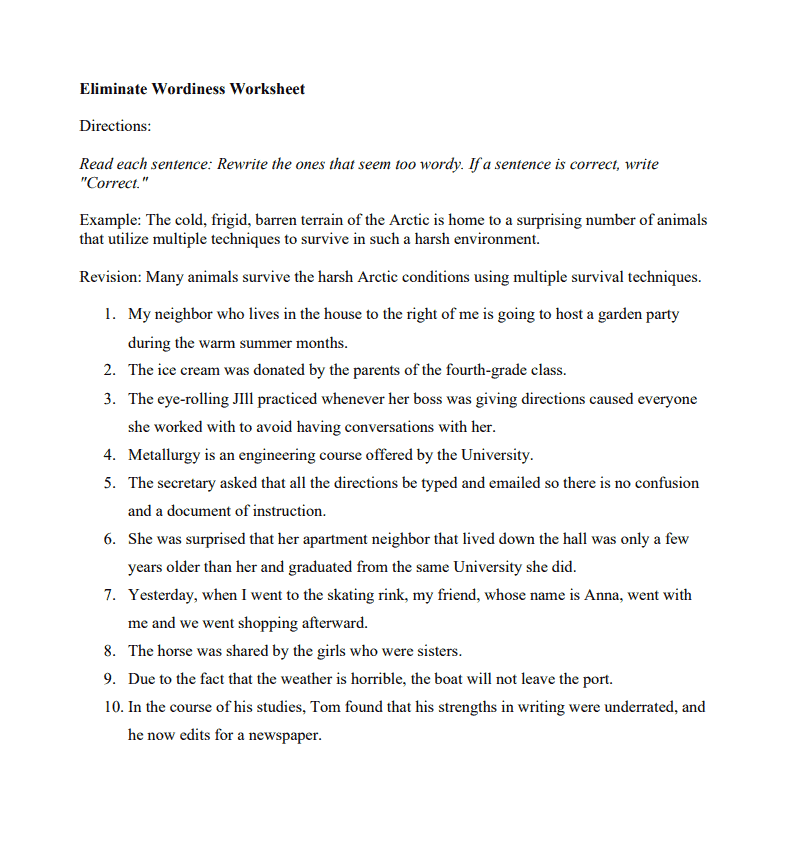If you want your writing to be clear and understandable to an audience, you need to avoid wordy sentences. But, this can be difficult, and you might be wondering what constitutes a wordy sentence.
Is it a sentence that is too long? Is it a sentence that has too many complex words? Is it an overly compound sentence?
The answer isn’t as simple as yes or no since a long sentence or one rich in vocabulary doesn’t necessarily define wordiness. Rather, a wordy sentence often has too many unnecessary words.
Let’s look at how to determine if your sentence is too wordy and how to fix it.
What is a Wordy Sentence?
The primary purpose of your writing should always be to make a clear and concise point to your reader. This is especially important when conveying information.
Strong vocabulary and creativeness should be part of the process, but a fine line exists between enough and too much. This often takes the shape of too many synonyms, redundancies, or unnecessary language. This can muddy the waters and create confusion or force the reader to go back to determine the passage’s main point.
Therefore, a wordy sentence is a sentence that contains unnecessary words or phrases and can be simplified without losing information or tone.
What to Avoid: Rules for Writing Concise Sentences

If you are unsure whether your sentence is wordy or not, there are specific writing tips to keep in mind to help keep your writing more focused and concise. This does not mean you must write shorter sentences or leave out impressive vocabulary. Nor do you have to avoid your own writing style or apply all of the following suggestions.
Passive Voice Sentences
A passive voice uses a form of the verb “to be” and a past participle of the main verb. The use of passivity isn’t a bad thing, but when it’s important to know who or what performs the action, use an active voice.
For example:
The professor’s lectures are seen as informational and thought-provoking.
Change to:
The students see the professor’s lectures as informational and thought-provoking.
Redundancy
Redundant expressions are the repetition of saying the same thing more than once in different words. In other words, you are repeating yourself. Usually, this is seen from sentence to sentence or paragraph to paragraph. But, occasionally, it happens within a sentence as well.
For example:
She opened her notebook to review the notes she had written inside.
Change to:
She reviewed the notes she wrote in her notebook.
Vague Pronouns
Vague pronouns make a sentence sound uncertain and lack confidence. Don’t add vague or unnecessary pronouns when you can more simply state what you need to say.
For example:
It’s suggested that the professor may believe that the study of neutrons in relation to electrons has been oversimplified, and scientists aren’t looking at the correct data.
Change to:
The professor’s lectures indicate a belief that data used by scientists about the study of neutrons and their relation to electrons is incorrect.
Unnecessary Language
All of the above includes examples of unnecessary language. Unnecessary language is defined as words or phrases that are either not needed for understanding the sentence or take away from the meaning of the sentence.
For example:
He was not overly confident in his ability to read through his notes to study for the test since he did not understand the lectures while taking those notes.
Change to:
Since he found the lectures difficult to understand, he had no confidence in his notes while studying for the test.
Prepositional Phrases
Prepositions show the relationship between ideas. They are necessary for a sentence to make sense but can easily be overused. Avoid creating a string of prepositions that can clutter your sentences and confuse your reader.
For example:
One of the books she had read during her time in his class became a favorite choice after she graduated despite how many problems she had with the lectures.
Change to:
Despite her difficulties with his lectures, one of her favorite books after graduation was from his class.
Nouns in Place of Verbs
Nouns formed from verbs are called nominalizations. They usually end in -ence, -ness, or -tion and weaken the action of the sentence. If you find yourself using nouns in place of verbs, change the sentence structure to emphasize the use of a verb instead.
For example:
The capitalization of proper nouns is essential for clarification of the sentence subject where appropriate.
Change to:
Where appropriate, capitalize proper nouns to clarify the sentence subject.
Too Much Punctuation
Sentences that are full of punctuation should be simplified if possible. The overuse of commas is an indication that a sentence is too wordy. Breaking the sentence into more than one sentence is also possible.
For example:
My friend, Pete, has an excellent resume, which has landed him some great jobs, has worked all over the world, played semi-professional sports, and is a great father.
Change to:
My friend, Pete, has a diverse resume due to his experiences that have provided great job opportunities. He is also a great father.
Wordy Phrases: Examples and How to Correct Them
To make your writing more concise, watch out for the wordy expressions listed below. These are commonly used in writing and speech but can clutter up sentences and create a tone of uncertainty when too many are used. Each usually bears replacement with a shorter alternative.
- As of late: lately.
- As per: per.
- Basis (e.g., on a daily basis, on a regular basis): daily, regularly, etc.
- (In) between: Between
- Do damage to: damage.
- Do harm to: harm.
- During the course of: during.
- First and foremost: One or the other
- For the duration of: during, through, for, or throughout.
- For the purpose(s) of: to or for.
- In excess of: more than, over, or exceeding.
- (To be) in need of: need
- In order to: to.
- In terms of: in or for.
- In the affirmative: yes.
- In the course of: during, in, over, or while
- In the midst of: Try amid, amidst, among, during, or in.
- In the negative: no.
- In the process of: remove phrase completely
- Make an effort: try.
- (The) majority of: most.
- Manner, e.g. in a prompt manner, in a positive manner: Where possible, replace with a one-word adverb—e.g., in a prompt manner becomes promptly, in a positive manner becomes positively.
- (A) myriad of: myriad.
- Of late: lately.
- Off of: When off is a preposition, remove of.
- Outside of: When outside is a preposition, remove of
- Overly: The prefix over- is useful. Attach it to the word overly modifies (no hyphen required)—for example, overly aggressive becomes overaggressive; overly careful becomes overcareful.
- Point in time: point or time.
- Previous to: before.
- Prior to: before.
- Sooner rather than later: soon, as soon as possible, and in the near future.
- Take into consideration: consider.
- That which: Where that which has no antecedent, it can be shortened to what.
- With the exception of: except.
Let’s Review
Wordy sentences can distract your reader from a sentence’s focus. A wordy sentence can be long or short, and is defined by the addition of unnecessary words, redundancy, and poor phrasing. Using a passive voice can also occasionally be a mark of wordiness.
Worksheet

